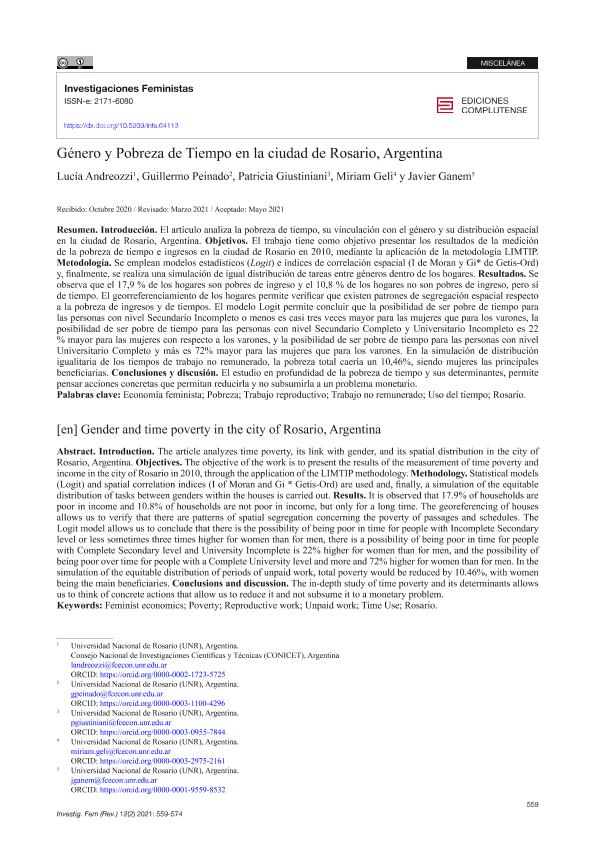Artículo
Introducción. El artículo analiza la pobreza de tiempo, su vinculación con el género y su distribución espacial en la ciudad de Rosario, Argentina.
Objetivos. El trabajo tiene como objetivo presentar los resultados de la medición de la pobreza de tiempo e ingresos en la ciudad de Rosario en 2010, mediante la aplicación de la metodología LIMTIP.
Metodología. Se emplean modelos estadísticos (Logit) e índices de correlación espacial (I de Moran y Gi* de Getis-Ord) y, finalmente, se realiza una simulación de igual distribución de tareas entre géneros dentro de los hogares.
Resultados. Se observa que el 17,9 % de los hogares son pobres de ingreso y el 10,8 % de los hogares no son pobres de ingreso, pero sí de tiempo. El georreferenciamiento de los hogares permite verificar que existen patrones de segregación espacial respecto a la pobreza de ingresos y de tiempos. El modelo Logit permite concluir que la posibilidad de ser pobre de tiempo para las personas con nivel Secundario Incompleto o menos es casi tres veces mayor para las mujeres que para los varones, la posibilidad de ser pobre de tiempo para las personas con nivel Secundario Completo y Universitario Incompleto es 22 % mayor para las mujeres con respecto a los varones, y la posibilidad de ser pobre de tiempo para las personas con nivel Universitario Completo y más es 72% mayor para las mujeres que para los varones. En la simulación de distribución igualitaria de los tiempos de trabajo no remunerado, la pobreza total caería un 10,46%, siendo mujeres las principales beneficiarias.
Conclusiones y discusión. El estudio en profundidad de la pobreza de tiempo y sus determinantes, permite pensar acciones concretas que permitan reducirla y no subsumirla a un problema monetario. Introduction. The article analyzes time poverty, its link with gender, and its spatial distribution in the city of Rosario, Argentina.
Objectives. The objective of the work is to present the results of the measurement of time poverty and income in the city of Rosario in 2010, through the application of the LIMTIP methodology.
Methodology. Statistical models (Logit) and spatial correlation indices (I of Moran and Gi * Getis-Ord) are used and, finally, a simulation of the equitable distribution of tasks between genders within the houses is carried out.
Results. It is observed that 17.9% of households are poor in income and 10.8% of households are not poor in income, but only for a long time. The georeferencing of houses allows us to verify that there are patterns of spatial segregation concerning the poverty of passages and schedules. The Logit model allows us to conclude that there is the possibility of being poor in time for people with Incomplete Secondary level or less sometimes three times higher for women than for men, there is a possibility of being poor in time for people with Complete Secondary level and University Incomplete is 22% higher for women than for men, and the possibility of being poor over time for people with a Complete University level and more and 72% higher for women than for men. In the simulation of the equitable distribution of periods of unpaid work, total poverty would be reduced by 10.46%, with women being the main beneficiaries.
Conclusions and discussion. The in-depth study of time poverty and its determinants allows us to think of concrete actions that allow us to reduce it and not subsume it to a monetary problem.
Género y Pobreza de Tiempo en la ciudad de Rosario, Argentina
Título:
Gender and time poverty in the city of Rosario, Argentina
Andreozzi, Lucía ; Peinado, Guillermo
; Peinado, Guillermo ; Giustiniani, Patricia Sonia; Geli, Miriam; Ganem, Javier Eduardo
; Giustiniani, Patricia Sonia; Geli, Miriam; Ganem, Javier Eduardo
 ; Peinado, Guillermo
; Peinado, Guillermo ; Giustiniani, Patricia Sonia; Geli, Miriam; Ganem, Javier Eduardo
; Giustiniani, Patricia Sonia; Geli, Miriam; Ganem, Javier Eduardo
Fecha de publicación:
18/06/2021
Editorial:
Instituto de Investigaciones Feministas
Revista:
Investigaciones Feministas
ISSN:
2171-6080
e-ISSN:
2171-6080
Idioma:
Español
Tipo de recurso:
Artículo publicado
Clasificación temática:
Resumen
Archivos asociados
Licencia
Identificadores
Colecciones
Articulos(CCT - ROSARIO)
Articulos de CTRO.CIENTIFICO TECNOL.CONICET - ROSARIO
Articulos de CTRO.CIENTIFICO TECNOL.CONICET - ROSARIO
Citación
Andreozzi, Lucía; Peinado, Guillermo; Giustiniani, Patricia Sonia; Geli, Miriam; Ganem, Javier Eduardo; Género y Pobreza de Tiempo en la ciudad de Rosario, Argentina; Instituto de Investigaciones Feministas; Investigaciones Feministas; 12; 2; 18-6-2021; 559-574
Compartir
Altmétricas



